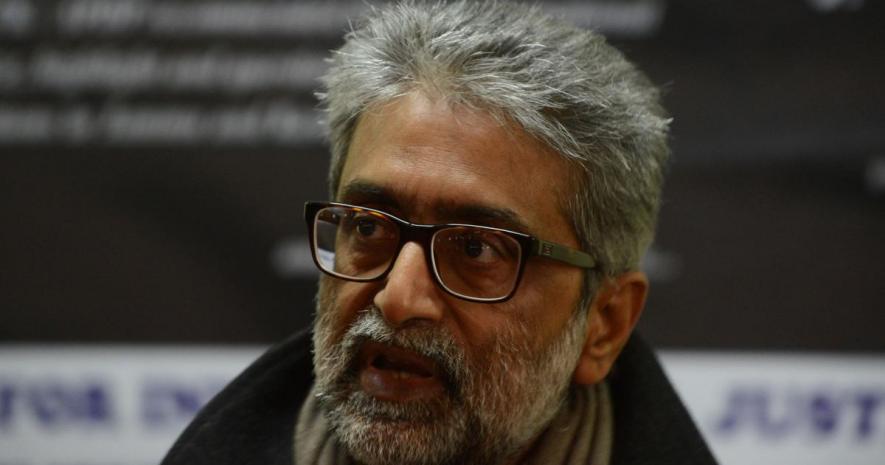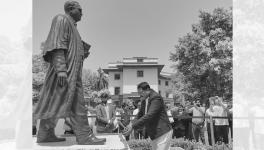NIA Opposes Gautam Navlakha’s Plea For Moving House Arrest From Mumbai to Alibag

The State opposed the change in the place of house arrest on the grounds of being “cumbersome” and creating a “security risk”. It also alleged that the plea demonstrated that Navlakha’s earlier arguments seeking house arrest on medical grounds was a farce because there is no super-speciality hospital in the vicinity of the newly proposed venue of house arrest. Senior advocate Nitya Ramakrishnan, representing Navlakha, opposed these arguments. The Bench has granted Navlakha time to search for other appropriate houses in Mumbai.
—
On Monday, a division Bench of the Supreme Court, comprising Justices K.M. Joseph and B.V. Nagarathna, allowed journalist and human rights activist Gautam Navlakha time until August 18 to find another suitable place for house arrest in Mumbai.
The Bench was hearing Navlakha’s application for the change of his place of house arrest from the current place in Mumbai to Alibag. It has directed the National Investigation Agency (NIA) to file a counter-affidavit within a period of four weeks.
Navlakha, an accused in the Bhima Koregaon–Elgar Parishad Maoist links/criminal conspiracy case, is charged under the stringent Unlawful Activities (Prevention) Act, 1967. Navlakha was arrested for his alleged involvement in the case on August 28, 2018.
Initially kept under house arrest, he was subsequently sent to judicial custody in April 2020 and stands accused along with 15 others. He had earlier been lodged at the Taloja Central Jail in Mumbai, and is awaiting trial.
A chargesheet was filed on October 9, 2020; charges are yet to be filed by the court.
On April 28, Additional Solicitor General of India S.V. Raju, representing the NIA, had opposed Navlakha’s application to change his place of house arrest to Alibag due to the difficulties of staying at the current venue of his house arrest in Mumbai. Subsequently, the Bench directed the NIA to file a counter-affidavit.
Today, continuing with his arguments, Raju stated three reasons for opposing the proposed change in the venue of the house arrest. Firstly, he submitted that the newly proposed place does not have a super-speciality hospital in the vicinity and alleged that the medical condition for which Navlakha sought to be placed under house arrest is a farce.
Secondly, Raju contended that since the proposed house in Alibag is around 110 kilometres from the court, it is bound to be “cumbersome” to take Navlakha to court whenever called upon.
Thirdly, Raju argued that the house cannot be adequately secured on account of its location.
Senior advocate Nitya Ramakrishnan, representing Navlakha, submitted that Alibag is in the same district as Taloja jail, where Navlakha was previously lodged. Further, she vehemently rejected the Additional Solicitor General’s submission that Navlakha’s medical condition is a farce and emphasised that the court has previously accepted his medical reports by Jaslok Hospital to be true.
On account of the proposed house not being satisfactory for the NIA, Ramakrishnan sought time to search for other appropriate houses in Mumbai to which Navlakha’s house arrest could be moved.
Subsequently, the Bench allowed time to search for other such houses and posted the matter for further hearing on August 18. On the Additional Solicitor General’s request, the NIA was granted a period of four weeks to file a counter-affidavit.
On November 10 last year, another division Bench of the court, comprising Justices Joseph and Hrishikesh Roy, had allowed Navlakha to be placed under house arrest for a period of one month under certain restrictions. On November 19, after hearing and incorporating additional concerns of the NIA, the Bench had dismissed the petition filed by the NIA to vacate the Order granting house arrest and directed the house arrest Order to be implemented within 24 hours of its pronouncement.
Since then, his house arrest has been periodically extended by the court.
Background
In May 2021, the Supreme Court rejected Navlakha’s default bail on the ground that the 35 days he spent under house arrest in 2018 did not constitute custody in order to compute the 90-day period within which a charge sheet must be filed under criminal law, to entitle him to default bail.
On October 12, 2021, Navlakha was shifted to the ‘anda circle’ (high-security zone) from the barracks at Taloja, further deteriorating his health, as claimed by his partner, Sahba Hussain.
On April 26 last year, the Bombay High Court dismissed Navlakha’s petition that sought his transfer from the Taloja jail in Navi Mumbai to house arrest. On May 23, 2022, Navlakha approached the NIA to be provided with a mosquito net, which he had been previously allowed but which was subsequently taken away by the prison authorities.
Earlier, prison authorities had refused his request for a new pair of spectacles, which were given only after media and legal intervention.
The Maharashtra prison authority has also barred Navlakha from availing telephonic communication facilities in Taloja, as per a circular signed by the state’s inspector general of police that provides that undertrial prisoners booked for terrorism or other “serious charges” cannot make telephone calls from the prison.
The prosecution in the case has filed a chargesheet exceeding 5,000 pages and intends to cross-examine at least 200 witnesses. Thirteen of the 16 accused persons are presently incarcerated, having now spent between three to almost five years in judicial custody without trial. Another accused, tribal rights activist and Jesuit priest Fr Stan Swamy, passed away in judicial custody in July 2021 after contracting COVID-19 in prison while awaiting bail on medical grounds.
Sarah Thanawala is a staff writer at The Leaflet
Get the latest reports & analysis with people's perspective on Protests, movements & deep analytical videos, discussions of the current affairs in your Telegram app. Subscribe to NewsClick's Telegram channel & get Real-Time updates on stories, as they get published on our website.
























